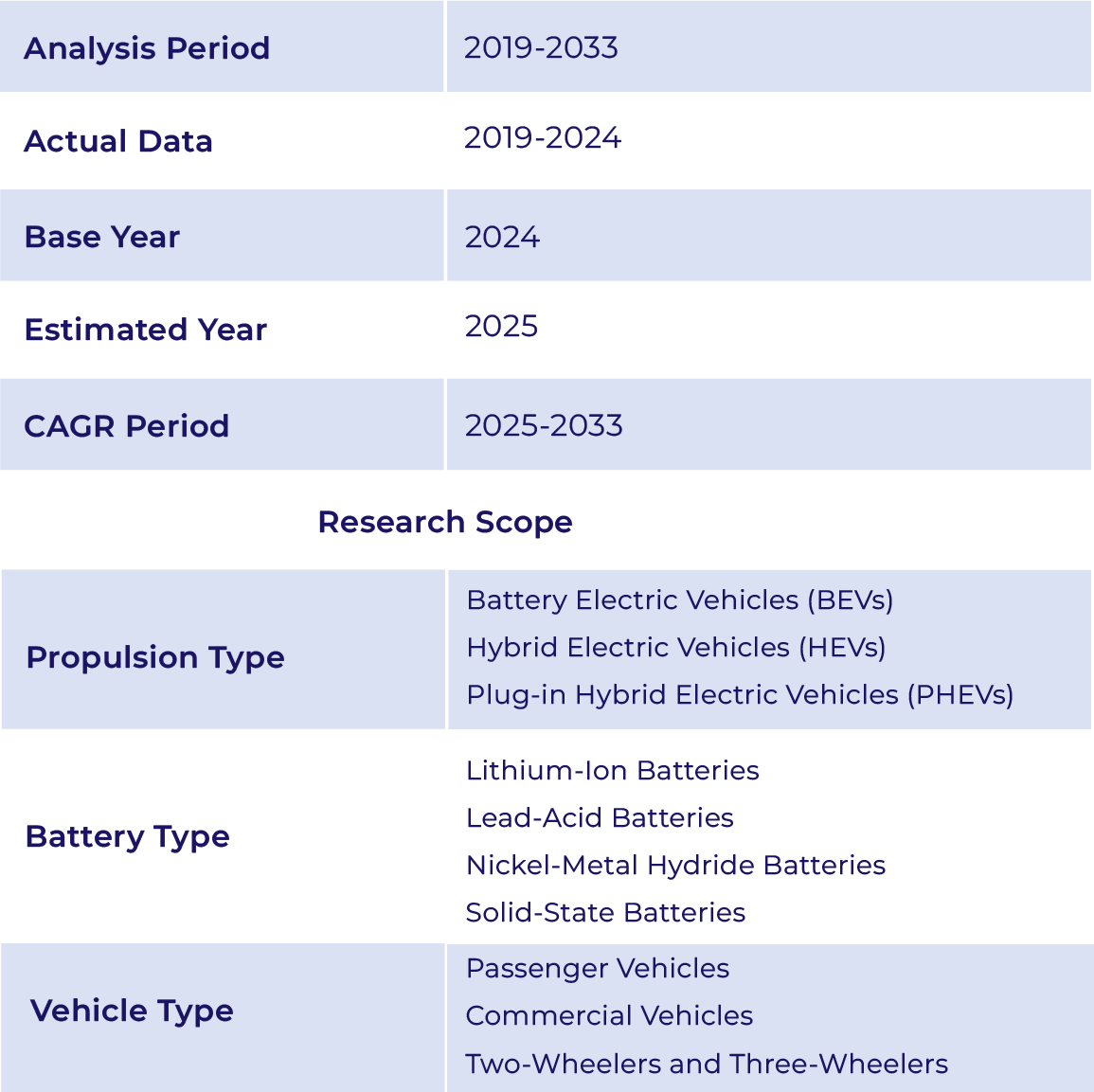Japan Electric Vehicle (EV) Battery Market Size and Forecast by Propulsion Type, Battery Type, and Vehicle Type: 2019-2032
Report Format:
| Pages: 110+
Type: Niche Industry Monitor
| ID: DEF478
| Publication: March 2025
|
US$745 |
Japan Electric Vehicle Battery Market Growth and Performance
- The Japan electric vehicle battery market size amounts to US$ XX Million in 2032. The market is likely to grow annually by XX% (CAGR 2024-2032).
- In 2023, the market size of the electric vehicle battery industry in Japan was US$ XX Million.
Japan Electric Vehicle Battery Market Outlook
The Japan electric vehicle battery market is poised for significant growth, driven by advancements in battery technology and government initiatives supporting electrification. Japan stands as a prominent hub for EV battery innovation, with companies like Panasonic, Honda, and Toyota at the forefront of developing next-generation batteries. The country’s push for energy transition has accelerated investments in solid-state batteries, which promise higher energy density and longer lifespans. Additionally, Japan's extensive network of EV manufacturers and suppliers ensures a robust ecosystem for battery production. With increasing demand for energy storage and electric mobility, the market is expected to expand rapidly in the coming years. Furthermore, collaborations with international automakers, such as the Panasonic-Tesla partnership, further bolster Japan's competitive position in the EV battery industry.
Japan Electric Vehicle Battery Market Drivers
The growth of Japan electric vehicle battery market is primarily driven by stringent government policies aimed at accelerating clean energy adoption and reducing carbon emissions. Substantial subsidies and tax incentives for EV adoption have intensified demand for high-performance, cost-efficient battery solutions. Japan’s leadership in lithium-ion and solid-state battery innovation, with companies like Honda advancing next-generation technologies, provides a competitive advantage. Solid-state batteries, offering higher energy density, faster charging, and improved safety, are a key focus area. Additionally, increasing investments in renewable energy storage and the expansion of virtual power plants (VPPs) are boosting demand for high-capacity batteries to enhance grid stability. The rapid expansion of EV manufacturing infrastructure, exemplified by Panasonic’s Gigafactory, further strengthens Japan’s position as a global leader in EV battery innovation.
Japan Electric Vehicle Battery Industry Trends
The EV Battery Industry in Japan is undergoing a significant transformation, driven by key trends shaping its future. A major shift is occurring toward solid-state battery technology, which offers superior energy density, longer lifespan, and enhanced safety compared to conventional lithium-ion batteries. Honda has taken a strategic initiative in this space by establishing a demonstration facility to accelerate solid-state battery production. Strategic partnerships between Japanese battery manufacturers and global EV leaders are also playing a pivotal role in market expansion. The Panasonic-Tesla collaboration has been instrumental in scaling mass battery production and refining manufacturing efficiencies.
Additionally, the growing adoption of home energy storage solutions and smart grid technologies is driving demand for residential battery systems. Government regulations mandating solar panel installations in new homes from 2025 are expected to further boost the need for energy storage solutions. Moreover, Japan’s continued investment in next-generation EV battery technologies aligns with its broader strategy to reinforce its leadership in the global battery market, ensuring long-term competitiveness and innovation.
Japan Electric Vehicle Battery Market Industry Development
The Japan Electric Vehicle Battery Market is undergoing rapid industrial developments, with key players investing heavily in research and production facilities. For instance, in September 2024, Japan announced a significant initiative to strengthen its domestic electric vehicle (EV) battery industry by allocating up to $2.4 billion in subsidies. This funding aims to expand the country's battery supply chain, increasing annual production capacity from 80 gigawatt-hours (GWh) to approximately 120 GWh—an overall growth of 50%. The government will support 12 battery-related projects, with major investments from companies like Toyota, Nissan, and Panasonic. Toyota, for example, plans to invest 245 billion yen to enhance production capacity for solid-state and prismatic batteries by an additional 9 GWh, with supply expected to begin in November 2026.
Additionally, in September 2024, Panasonic Energy has completed preparations to launch mass production of its next-generation 4680 cylindrical lithium-ion batteries. These advanced cells provide five times the capacity of the previous 2170 model, extending driving ranges and reducing the number of cells required per battery pack. This development aligns with Japan’s broader strategy to solidify its position as a global leader in EV battery technology.
Japan Electric Vehicle Battery Market Scope
















